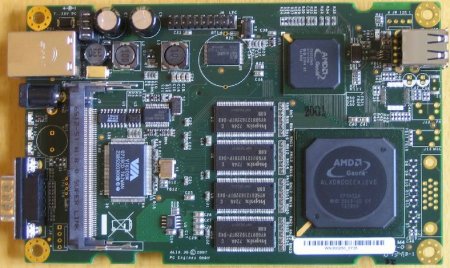Open-source server appliance is “free”
Oct 3, 2008 — by Eric Brown — from the LinuxDevices Archive — 4 views KangarooBox is shipping a “free” open-source server appliance that runs Debian 5 GNU/Linux. Targeting small offices, the silent, fanless “Joey” employs an AMD Geode-based PC Engines ALIX 3c2 single-board computer (SBC), and is given to customers buying a $3,000 one-year support plan, the company says.
KangarooBox is shipping a “free” open-source server appliance that runs Debian 5 GNU/Linux. Targeting small offices, the silent, fanless “Joey” employs an AMD Geode-based PC Engines ALIX 3c2 single-board computer (SBC), and is given to customers buying a $3,000 one-year support plan, the company says.
(Click for larger view of the Joey)
Although the PC Engines ALIX 3c2 board that runs the Joey offers Ethernet, USB, and serial connections, the Joey is limited to a single 10/100 Ethernet port and a power connection. The ALIX (pictured below), which is heir to PC Engines's venerable WRAP board, was recently used by Deciso for its 19″ Appliance Development Kit (ADK) for rack-mounted network appliances.

The PC Engines ALIX 3c2 inside the Joey
(Click to enlarge)
The Joey is powered by a 500MHz AMD Geode LX800 processor with 256MB DDR DRAM and 4GB flash. The Ethernet connection is based on a Via VT6105M part, says the company. Dimensions were not provided for the device, but the ALIX board measures 3.9 x 6.3 inches and is said to consume between 7V and 20V of power.
Like the somewhat similar Debian-based Excito Bubba II, the Joey is based entirely on open source software. Here are the key components used in the Joey project, along with a few comments sent by the company's Richard Hurt in an email interview:
- Debian GNU Linux 5.0 — The Lenny release of Debian runs the server, and includes the APT package management system, which KangarooBox uses for its update system.
- SilverStripe — This XHTML-compliant, Sapphire-based content management system (CMS) comes with a BSD license.
- Box Backup — Used for disaster recovery, Box Backup “allows us to keep a current copy of the appliance contents in a secure manner,” says the KangarooBox site. Hurt went on to add, “It allows us to securely save the system state so that we can provide the customer a replacement box without too much hassle.”
- Redmine — The company uses Redmine for issue tracking and project management.
- Puppet — This system automation task manager keeps the company's systems updated. “With lots of systems in the field we needed a way to make sure they were all maintained the same way,” wrote Hurt.
- Rsync — This incremental file transfer app “pushes log information back to HQ where we use Splunk for parsing and alerting,” writes Hurt. “Splunk is not Open Source, but they are very Linux friendly and their base version doesn't cost anything to process 500MB/day.”
- Zabbix — This monitoring, alerting, and visualization application “lets us know the physical state of the system and allows us to head off any problems before the customer knows it,” writes Hurt. “For instance, if the box is sitting on top of a radiator, Zabbix will inform us of the increased temperature and we can email the customer and ask them to move it to a cooler location.”
The Joey's one-year support plan includes disaster recovery, customer service, and maintenance, says KangarooBox. It also includes the Joey box itself, which users can keep even if they don't renew for a second year. The plan offers 24×7 email and business hours phone support, with on-site support costing extra, says the company.
Availability
The Joey is available now, free with a one-year $3,000 service plan, says KangarooBox. The company is planning to introduce a larger “Boomer” appliance capable of serving “100's of simultanious users and/or projects.” More information may be available here.
This article was originally published on LinuxDevices.com and has been donated to the open source community by QuinStreet Inc. Please visit LinuxToday.com for up-to-date news and articles about Linux and open source.